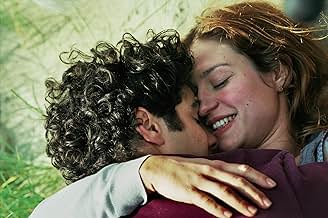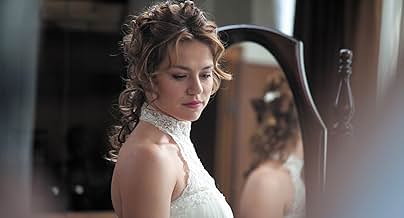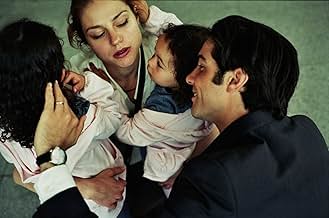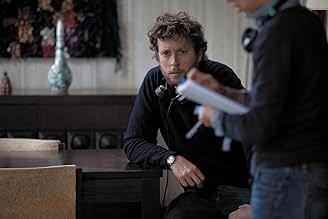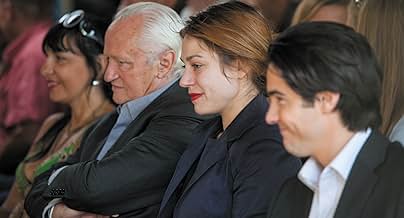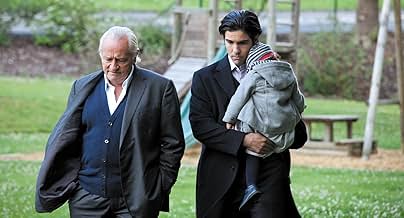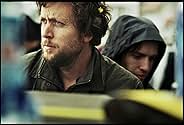AVALIAÇÃO DA IMDb
6,8/10
3,2 mil
SUA AVALIAÇÃO
Um médico adota uma criança e a cria como se fosse sua. Na idade adulta, o rapaz se casa e forma uma família, mas continua dependente de seu pai adotivo.Um médico adota uma criança e a cria como se fosse sua. Na idade adulta, o rapaz se casa e forma uma família, mas continua dependente de seu pai adotivo.Um médico adota uma criança e a cria como se fosse sua. Na idade adulta, o rapaz se casa e forma uma família, mas continua dependente de seu pai adotivo.
- Direção
- Roteiristas
- Artistas
- Prêmios
- 9 vitórias e 12 indicações no total
- Direção
- Roteiristas
- Elenco e equipe completos
- Produção, bilheteria e muito mais no IMDbPro
Avaliações em destaque
Few artists can do what Mister Arestrup does.A character actor in the noblest sense of the word,he never gives you the impression he overplays ;yet,he can be frightening ,makes you blood run cold ,while remaining extremely restraint.In the five last years ,his two portrayals (the wine-grower in "Tu Seras Mon Fils " ,and the stepfather in "A Perdre La Raison") are among the most impressive in the contemporary French cinema.
A Young couple (she is a French Teacher,he is a Morrocan immigrant)sees their life ,slowly but inexorably ,elude them.The Young man's stepfather he calls his Godfather provides them with everything a Young couple may wish :no problem to make ends meet .But the lack of intimacy becomes hard to bear for the Young woman who would like to share a true home with her husband.But the wealthy man does not want his protégés to run away and he 's using financial blackmail as well as emotional blackmail.They are under "tutelage" :the Young man ,who seems immature sees his protector as a merciful God but his wife is not prepared to accept it.This house is not big enough for the three of us.
It's putting off the inevitable;the last scene ,showing the house of "happiness" ,filmed in fixed camera shot ,could not have been more harrowing.
A Young couple (she is a French Teacher,he is a Morrocan immigrant)sees their life ,slowly but inexorably ,elude them.The Young man's stepfather he calls his Godfather provides them with everything a Young couple may wish :no problem to make ends meet .But the lack of intimacy becomes hard to bear for the Young woman who would like to share a true home with her husband.But the wealthy man does not want his protégés to run away and he 's using financial blackmail as well as emotional blackmail.They are under "tutelage" :the Young man ,who seems immature sees his protector as a merciful God but his wife is not prepared to accept it.This house is not big enough for the three of us.
It's putting off the inevitable;the last scene ,showing the house of "happiness" ,filmed in fixed camera shot ,could not have been more harrowing.
I am not a professional reviewer nor a movie expert. I have been struck by this movie since I recognize a lot in my personal life. My wife suffers from a bipolar disorder, and it took us 10 years to understand what she has before we could start proper treatment. This movie shows in a subtle and nuanced way, without judging, the systemic and destructive effects of this dreadful illness.
I am fascinated by the way Joachim Lafosse, already at the age of 37, has been able to show the transformation of the relationship and behavior of the two other main characters, the partner and doctor. Many reviews suggest a perpetrator-victim relationship, for me Lafosse effectively showed that the whole family is a victim of this illness. In French "Tout comprendre c' est tout pardonner"; when you understand, you forgive. Very, very well done and the mother brilliantly played by Emilie Dequenne.
This is a must see for everybody who knows somebody with a mental illness.
I am fascinated by the way Joachim Lafosse, already at the age of 37, has been able to show the transformation of the relationship and behavior of the two other main characters, the partner and doctor. Many reviews suggest a perpetrator-victim relationship, for me Lafosse effectively showed that the whole family is a victim of this illness. In French "Tout comprendre c' est tout pardonner"; when you understand, you forgive. Very, very well done and the mother brilliantly played by Emilie Dequenne.
This is a must see for everybody who knows somebody with a mental illness.
What happens when a boy and girl meet from different cultures?
The excitement, the thrill, the joy of falling in LOVEz and spending life together. The dreamZ - the future plans etc.
Years go by - the babies are born, the work and life eats up the relationship The evil of time - deteriorates and suffocates everything we stood for.
This movie is about two lovers - Mounir (Tahir Rahim) a Morrocan immigrant living in Belgium and a Belgian girl Murielie (Emilie Dequence) falling in LOVEz and supported by the God-father of Mounir - Dr. Andre (Niels Arestrup) from being a catalyst in forming their LOVE-bond to blessing the couple to being with them in their honeymoon, to giving them shelter, money, food and even supporting their children.
Then what could go wrong? Murielie wanted freedom as a couple to live alone - and enjoy life, away from Dr.Andre - who uses kindness as blackmail and trap the young couple. Murielie feels suffocated and whenever she discusses with Mounir he always takes sides of Dr.Andre. Thus slowly and slowly Murielie feels isolated, disintegrated, and depressed becomes a routine housewives, bearing four beautiful children - caged and imprisoned within the burden of goodness and kindness shown by Dr.Andre.
What results in the end is so horrific and chilling that one goes aghast at the outcome.
It leaves the viewers devastated to say the least - viewing a claustrophobic tragedy destined to happen.
This superb movie is based on a true story.
It is a GREAT psychological drama of how slowly un-noticed the depression sets in through "subtle" everyday interaction of routine life and daily household chores. How a person feels isolated, neglected in a relationship, and above all how PATRIARCHY destroys completely a spirited young woman with dreams
The Director Joachim Lafosse has dealt with this very important subject with apt without taking sides and/ or blaming anyone, and left many questions unanswered.
Though in real life - when this incident happened - the society surely wanted a villain and thus was punished in the verdict.
The movie rests solely on the shoulders of Émilie Dequenne - who portrays Murielie so tenderly, graphically - showcasing her angst and silent sufferings with looks and stares. She literally makes an emphatical audience jump off their seat to extend a hand of help and hug her, give her support. It made me an instant life-long fan of Emilie Dequenne.
The remaining cast of Mounir and Dr.Andre too have played their part brilliantly. The director Joachim has extracted marvelous acting from little children.
At points it becomes unbearable to watch the movie and wants us to cry to intervene and turn the clock back.
But the real incident is history and can't be changed. GREAT work of cinema that I will surely remember for years
I would go with 7.75 out of 10 for this journey of joy to tragic despair.
The excitement, the thrill, the joy of falling in LOVEz and spending life together. The dreamZ - the future plans etc.
Years go by - the babies are born, the work and life eats up the relationship The evil of time - deteriorates and suffocates everything we stood for.
This movie is about two lovers - Mounir (Tahir Rahim) a Morrocan immigrant living in Belgium and a Belgian girl Murielie (Emilie Dequence) falling in LOVEz and supported by the God-father of Mounir - Dr. Andre (Niels Arestrup) from being a catalyst in forming their LOVE-bond to blessing the couple to being with them in their honeymoon, to giving them shelter, money, food and even supporting their children.
Then what could go wrong? Murielie wanted freedom as a couple to live alone - and enjoy life, away from Dr.Andre - who uses kindness as blackmail and trap the young couple. Murielie feels suffocated and whenever she discusses with Mounir he always takes sides of Dr.Andre. Thus slowly and slowly Murielie feels isolated, disintegrated, and depressed becomes a routine housewives, bearing four beautiful children - caged and imprisoned within the burden of goodness and kindness shown by Dr.Andre.
What results in the end is so horrific and chilling that one goes aghast at the outcome.
It leaves the viewers devastated to say the least - viewing a claustrophobic tragedy destined to happen.
This superb movie is based on a true story.
It is a GREAT psychological drama of how slowly un-noticed the depression sets in through "subtle" everyday interaction of routine life and daily household chores. How a person feels isolated, neglected in a relationship, and above all how PATRIARCHY destroys completely a spirited young woman with dreams
The Director Joachim Lafosse has dealt with this very important subject with apt without taking sides and/ or blaming anyone, and left many questions unanswered.
Though in real life - when this incident happened - the society surely wanted a villain and thus was punished in the verdict.
The movie rests solely on the shoulders of Émilie Dequenne - who portrays Murielie so tenderly, graphically - showcasing her angst and silent sufferings with looks and stares. She literally makes an emphatical audience jump off their seat to extend a hand of help and hug her, give her support. It made me an instant life-long fan of Emilie Dequenne.
The remaining cast of Mounir and Dr.Andre too have played their part brilliantly. The director Joachim has extracted marvelous acting from little children.
At points it becomes unbearable to watch the movie and wants us to cry to intervene and turn the clock back.
But the real incident is history and can't be changed. GREAT work of cinema that I will surely remember for years
I would go with 7.75 out of 10 for this journey of joy to tragic despair.
Depression is a terrible thing. The opening scene of 'My Children' tells us that an awful thing has happened, and the rest of the movie provides the background to the tragedy. It's a slow-paced film, and for much of its length, it feels too slow-paced for its own plot: it's not easy to see how the status quo is going to descend into tragedy within the allotted time. In the event, the end is sudden and not directly provoked: the cause is rather internal, the final snapping of its protagonist amid inner despair. Nonetheless, depression can be induced by real-world causes, and the film is actually, aside from its dramatic conclusion, an intriguing study of a subtly abusive relationship between an elderly doctor who in effect adopted a Moroccan family. In return for his generosity, he sought control, more control than any one person should have over the lives of others. Director Joachim Lafosse strangely shoots many scenes through out-of-focus doorways, a stylistic tic that I didn't quite understand; but this a powerful study nonetheless, a disturbing portrait of a family life that is superficially idyllic, but somehow not right nonetheless
The film sets out its stall very early, so we know within the first few minutes what we are about to see, but I spent ninety minutes in denial, hoping against all expectation that something would happen to change the course of the story.
The male characters are predictable without being cartoonish, but the female parts are outstanding. The Moroccan grandmother exemplifies the way the grandfather has been able to develop a God complex, critical of North African patriarchy while practicing it himself. It is the children's mother (Emilie Dequenne), though, who gives the most extraordinary performance. She is utterly compelling and places us, however unwillingly, into the position of the oppressed and abused. I am rarely a fan of child actors but Jade and Sohane could have been in a fly-on-the-wall documentary, so natural did they appear.
The end had a sense of horrific inevitability handled with the sympathetic discretion of Elvira Madigan, with the soundtrack adding to that comparison.
Staggeringly heartfelt, disturbing and painfully real. Truly devastating.
The male characters are predictable without being cartoonish, but the female parts are outstanding. The Moroccan grandmother exemplifies the way the grandfather has been able to develop a God complex, critical of North African patriarchy while practicing it himself. It is the children's mother (Emilie Dequenne), though, who gives the most extraordinary performance. She is utterly compelling and places us, however unwillingly, into the position of the oppressed and abused. I am rarely a fan of child actors but Jade and Sohane could have been in a fly-on-the-wall documentary, so natural did they appear.
The end had a sense of horrific inevitability handled with the sympathetic discretion of Elvira Madigan, with the soundtrack adding to that comparison.
Staggeringly heartfelt, disturbing and painfully real. Truly devastating.
Você sabia?
- CuriosidadesThe official entry of Belgium to the Best Foreign Language Film at the 85th Academy Awards 2013.
- ConexõesReferences Rocky III - O Desafio Supremo (1982)
Principais escolhas
Faça login para avaliar e ver a lista de recomendações personalizadas
- How long is Our Children?Fornecido pela Alexa
Detalhes
- Data de lançamento
- Países de origem
- Centrais de atendimento oficiais
- Idiomas
- Também conhecido como
- Perder la razón
- Locações de filme
- Dudelange, Luxemburgo(town hall for the wedding ceremony)
- Empresas de produção
- Consulte mais créditos da empresa na IMDbPro
Bilheteria
- Faturamento bruto nos EUA e Canadá
- US$ 23.203
- Fim de semana de estreia nos EUA e Canadá
- US$ 5.500
- 4 de ago. de 2013
- Faturamento bruto mundial
- US$ 700.215
- Tempo de duração
- 1 h 51 min(111 min)
- Cor
- Mixagem de som
- Proporção
- 2.35 : 1
Contribua para esta página
Sugerir uma alteração ou adicionar conteúdo ausente



